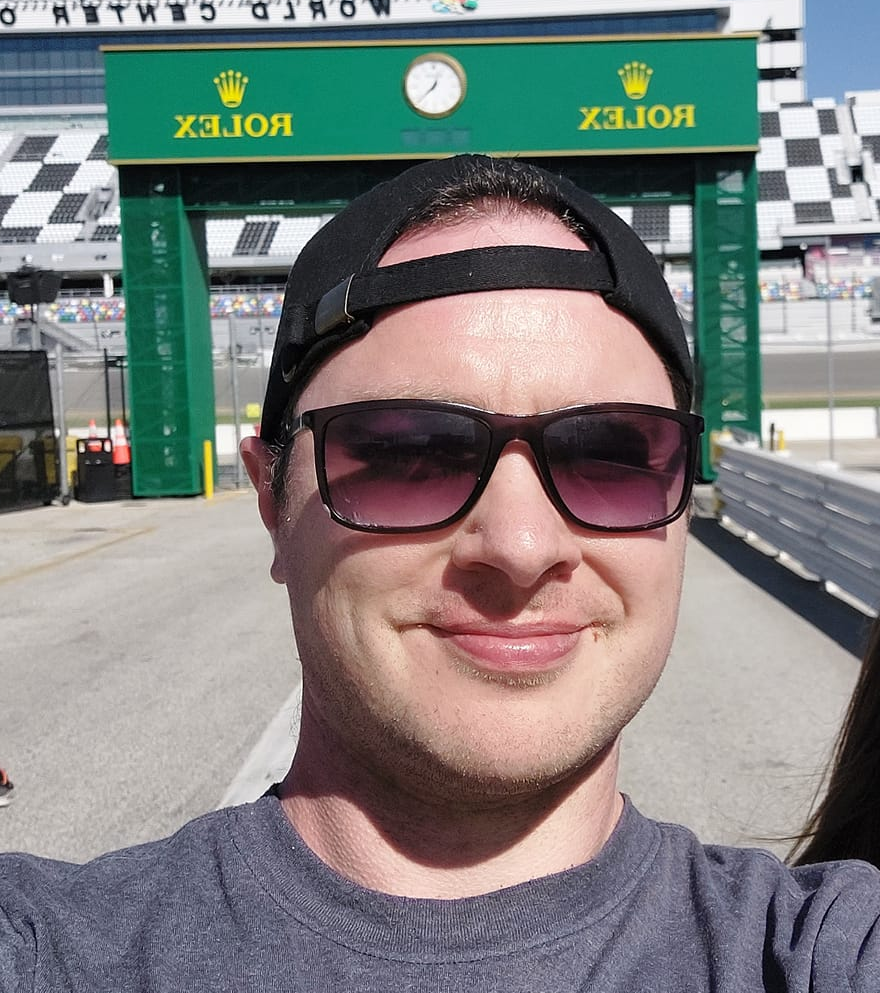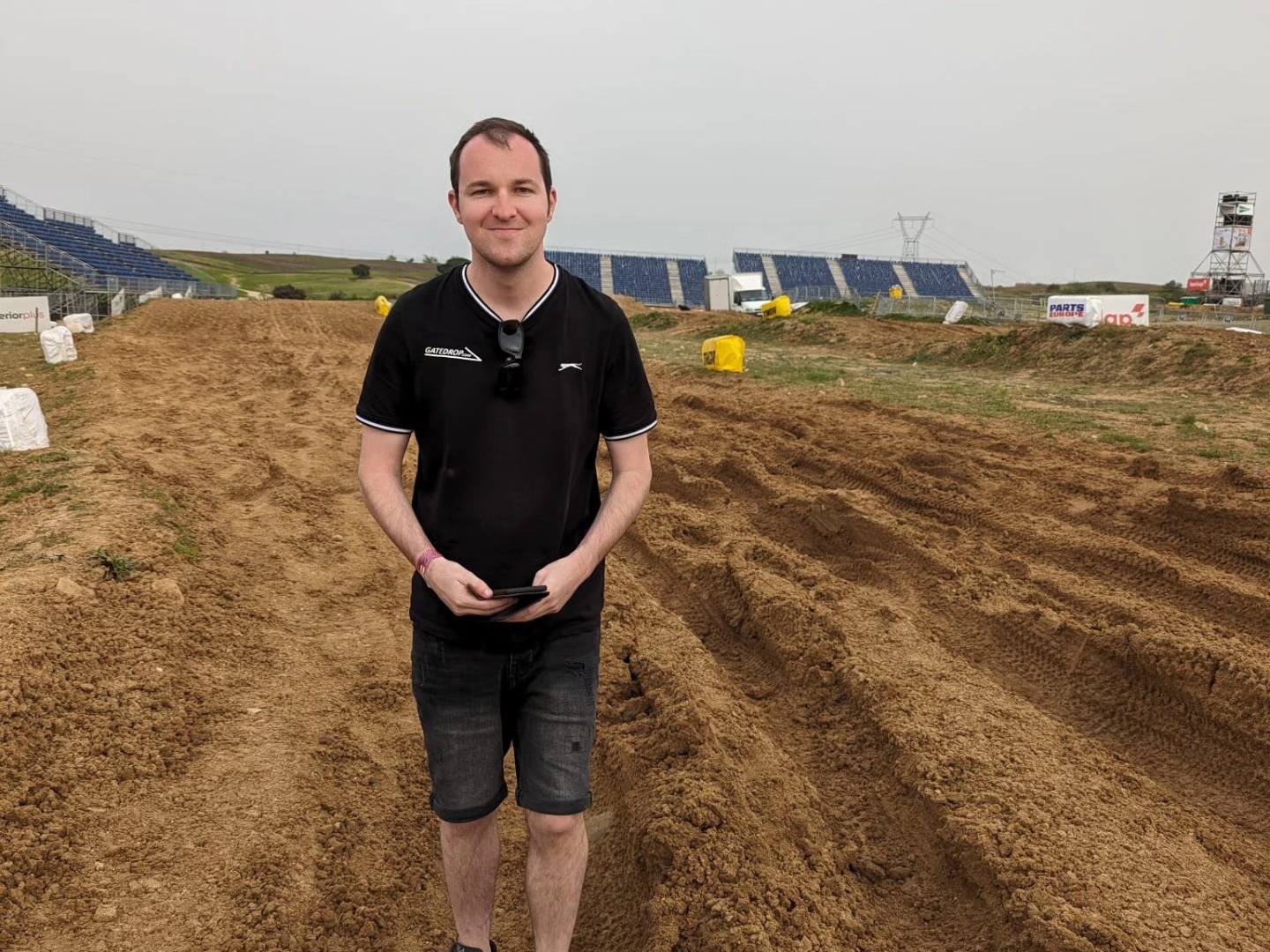In part two of our interview with Nick Moores we discuss the time he spent working in the GP paddock and how things have changed. Of course back when Moores was in the paddock there was a switch between 2-strokes and 4-strokes which must have been a challenge.
If you missed part one of the interview, you can read it here.
Gatedrop: When riders stand on top of the podium, casual fans don’t see the hard work the entire team put in, just what was a week like for you leading up to a GP and then a GP weekend? Busy I can imagine!
Moores: That’s the blurry bit, one minute you are packing up an awning at the end of a day, the next minute you were setting it all up again, fuelled on coffee and adrenaline hoping that whatever you did in the week was going to be complimentary to the rider and the track at the weekend!
Quite often Sunday night would turn into a Monday morning travelling, just depending on whether we were coming from a GP to a British or vice versa, the Channel ferry terminal was a common sight in MXGP racing! Monday and Tuesday would be a clean-up day, we were in charge of the trucks too, so trucks, awnings, race bikes had to be cleaned and prepped for the following weekend, let alone your own personal needs! Race bikes were completely stripped, chassis prepped and we would follow a strict schedule with servicing the suspension and engines. Parts and product ordering, any issues to be resolved, travel plans for the week after to be made, feedback to sponsors, maybe fit a midweek test in as well, makes me wonder how it all got dealt with! And let’s face it, whether you podium or not, the work is exactly the same, expectation can build with good results and that can be stressful when building a motorbike with more nuts and bolts than I’d care to mention!
Gatedrop: When you look back at your time in the paddock, any funny stories that stick out in your mind?
Moores: There were many, many funny stories. It was a happy time, good experiences had and great friends made. I have to be honest, one story was recounted to me by GC just last week. We were in Australia for the GP, based in Melbourne. After the weekend’s racing was done, it was usual on the fly away races that the organisers would lay a party or function of sorts with all parties invited. In Melbourne we were invited to a nightclub to let our hair down and albeit we were on invitations, we often underestimated that the club had strict entrance codes for dress. Even though we all felt we had an elevated guest list status, doormen don’t give a sh*t if you were a GP racer, if you didn’t match up you were not getting in. GC was in trainers, I had shoes, suede yes but shoes, but GC not. He tried the socks over the top routine that (apparently) works every time back in NI, but a double kickback meant that we were running out of options. Thankfully a late night shopping trip saved us, GC splashed 200 AUD on a pair of ridiculous looking shoes from a nearby store, dumped his trainers in the bin and walked straight into the club, success! The funny part wasn’t till we got in…. when waiting for a beer, Joel (Smets) came over tapped GC on the shoulder and pointed to his feet, apparently that outrageous style was the only one available in that size in that store, even World Champions had to comply and he was wearing the same shoes, his trainers being knocked back at the door too and Joel wasn’t going to miss a party either!

Gatedrop: Was there a GP you always enjoyed going to more than the rest and got excited for it? If so, why?
Moores: I think the British GP must be it, it feels like more pressure than usual as all the sponsors turn up as guests so everyone paying the bills is there to watch you in action, but with the fans the atmosphere is difficult to beat. With the home race, you usually don’t have to catch a ferry either!
I used to enjoy the flyaway races too but for a different reason. As there were no trucks and awnings as the bikes were crated, the barriers within the paddock were lowered and you found a better atmosphere as we all mucked in together, well perhaps not all but you get the picture!
Gatedrop: In the end you decided to leave the Motocross paddock behind, what made you make that decision and what are you up to now? Do you miss being a regular in the GP paddock and would you consider coming back?
Moores: When I decided to stop in MX I was at the end of the road as far as what I perceived I could give. I was never happy being a passenger, I had to feel that I was in constant progression, born from a desire to succeed. A year previously, when I returned to CAS from KTM, I set a workshop up in Belgium so the team could be EU based, saving costs on ferries (as we had such a big truck now!) and travelling back to the UK with small vans for the British Championship. It was a positive but tough time, I spent a cold winter in a campervan in the workshop carpark, painting floors, building benches, building a dyno room, bedrooms and living quarters for the team. I think subconsciously I was trying to make a separation from working as a team mechanic and although having worked with multiple riders simultaneously I think I craved the one to one repour you get to develop with just one rider. My relationship with GC was frayed and needed repairing, I was working with no set budget and literally trying to hold a team together with only verbal support, I spent my own money at times and in the end needed to change, to feel valued again.
Alpinestars were a main sponsor at the time and Davide Trolli was a main point of contact, he rang me out of the blue mid-2005 and asked what my plans were for the future, he said they could use me and wanted to fly me to Italy for a couple of days to talk. Rather than travel to RSA and Japan for the GPs, budget was low and practically I didn’t need to be there so I flew to Italy and talked a lot. It took the rest of the year to make the decision to leave, I started to work with them in 2006 as the Racing Product Development manager for worldwide Road Race. This was after the CAS team finished 2nd in the World Championships with Josh Coppins, my work with MX was done.
Now I live quite a varied life, I recently found my passion for MX again with the help of my friend GC. I work part time as a Mechanical Engineer on Bio-Mass power stations and for the rest of the time I selectively restore old MX bikes and also ride them. I enjoy my life, I’ve worked hard, perhaps too hard in the past and that takes its toll. Although I do visit the paddock from time to time I couldn’t return full time, I have been asked but it won’t happen!

Gatedrop: I believe you are currently involved in a pre-season project for Honda Japan for 6 weeks in Sardinia in Italy before the GP season gets underway. How did this opportunity come around and what’s your role?
Moores: So after I closed a Cycle shop here in the UK, which was post Alpinestars, I took some time off. GC sent me an email out of the blue, Honda Japan were looking to send their young and upcoming riders to train and potentially race preseason in Europe rather than the US and wanted to understand how to manage it. Although they have official teams here they wanted to run them in satellite but alongside the HRC team so as not to burden the team with any potential distractions but allowing the Japanese riders to shadow the HRC guys. Everything was needed, it was required to host the rider in everything including training on the bike, hotels, food requirements and so on, I bit the bullet, the lead time was short to get ready so I got loaded and soon set off heading South!
It was a strange feeling to be back on the road again but quite motivating, I met up with the Red Moto guys in Milan and leased a couple of CRF450’s, got some spares and got on with it. I know the guys at HRC well and it didn’t take long to find my way in Sardinia and Italy. We have repeated the project January and February this year again and it has been very rewarding, the Japanese have an incredible work ethic and it has been interesting helping them adapt to training and racing in Europe.
Gatedrop: When you look at the paddock now from the outside compared to when you were a GP mechanic, what things do you think have changed a lot? Back in your day there was switching between 2-stroke and 4-stroke – how was that? Now a day’s there seems to be more technology involved..
Moores: The 2 stroke to 4 stroke change was received a little like 1994 when the unleaded fuel rules were brought in, with a little resistance, it wasn’t anything that hadn’t been seen before but Industry forced production changes and the racing circus abides by those parameters. For me the 4 stroke was a big change as I was brought up on 2 stroke engines and the challenge of good development, the new direction did see the production bikes being so close to being race ready and didn’t need as much input and I do joke that “if the 250 2 strokes ever came back…” but we adapted and I think we built good bikes in 2004 and 2005. No one really likes big changes as the effort needed to catch up can be great but the technology was only going to go one way, it was about budgets and the wealthier teams (and factory teams of course) progressed more quickly, we should have been working on fuel injection when the CRF was introduced but we had talked about it for a few years with the 2 stroke, with what was available in Auto sport and road race it should have been a simple and quick progression, we just didn’t have the resources.
It’s interesting now looking in at the paddock, it seems there is a person for every job, motor guy, ignition guy, suspension guy, mechanic, helper mechanic, truck driver, team manager, team owner, chef, and coordinators! I realise that now there does seem to be more responsibilities to the bikes and technologies involved and It’s a big show to manage with all the travelling but somehow feels thin on the ground, no resemblance to where I began in the early 90’s but things do have to move on. There is a lot of discussion if its better or worse but I’ll leave that to the individual to cast their vote, I think the good old days are sometimes perceived as good because you either forgot all the sh*t you went through to go racing or you just weren’t there! Read Rob Andrews book, it gives a realistic insight!
Interview: Andy McKinstry
Main pic: Nigel McKinstry

















